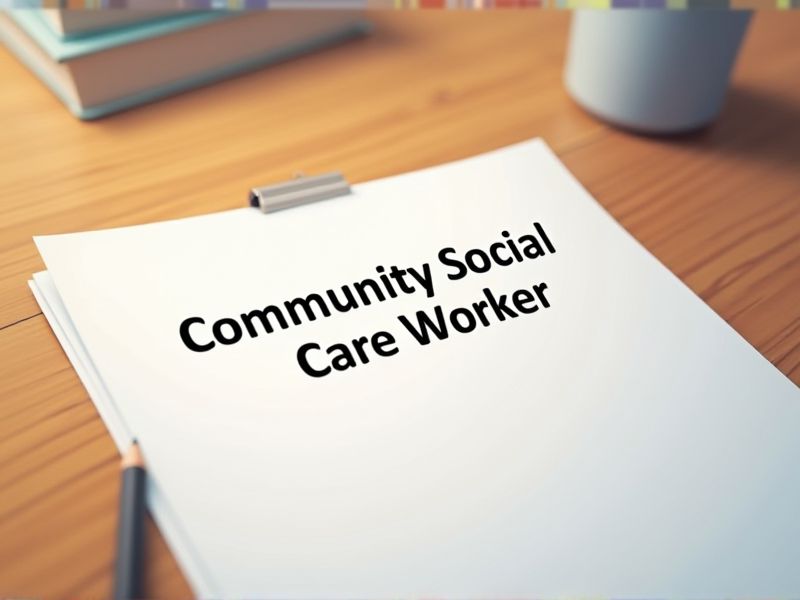
Community Social Care Workers play a crucial role in supporting and improving the lives of individuals and communities. Certifications are often required to ensure that workers possess the necessary skills and knowledge to effectively address complex social issues. These qualifications validate a worker's competence and readiness to handle various situations responsibly. Important certifications you may need for this role include the Care Certificate, NVQ in Health and Social Care, and Mental Health First Aid.
NVQ Level 2 in Health and Social Care
NVQ Level 2 in Health and Social Care provides essential foundational knowledge for Community Social Care Workers, ensuring they understand basic care protocols and standards. This qualification supports workers in delivering competent care services by training them in critical areas such as communication and safeguarding. By equipping workers with practical skills, the NVQ Level 2 ensures consistency and quality in care delivery, meeting regulatory requirements. Employing staff with this qualification can enhance the reputation and trust in care organizations, leading to improved client satisfaction and outcomes.
NVQ Level 3 in Health and Social Care
NVQ Level 3 in Health and Social Care provides Community Social Care Workers with essential skills and knowledge for effective client interaction. By achieving this level, workers are better equipped to handle complex care situations, which enhances service quality. The qualification ensures workers meet regulatory standards, aligning practices with legal and ethical guidelines. Having this qualification can boost career prospects as it demonstrates a commitment to professional development and competence in the field.
Care Certificate
The Care Certificate establishes a uniform set of standards, which enhances the quality of care provided by community social care workers. By ensuring staff possess fundamental skills and knowledge, the certificate reduces the risk of errors and improves patient safety. With a structured training framework, care workers experience increased confidence and competence in their roles. It fosters professional credibility, leading to greater trust from clients and families in the services provided.
Safeguarding Adults Certification
Community social care workers frequently encounter vulnerable adults who may be at risk of abuse or neglect, necessitating an understanding of safeguarding protocols to ensure their protection. Safeguarding Adults Certification equips workers with the essential skills to recognize signs of harm and effectively respond to potential threats. This certification strengthens the accountability and professionalism of care workers, enhancing public trust in provided services. Implementing standardized safeguarding practices through certification can reduce legal liabilities and improve the overall quality of care.
Mental Health First Aid
Community social care workers are often the first point of contact for individuals facing mental health challenges, making early identification and support essential. Mental Health First Aid equips these workers with the skills to recognize signs of distress and provide initial assistance, potentially preventing crises. This training enhances their ability to create a safer environment for both clients and staff by fostering a supportive atmosphere. By understanding mental health issues better, social care workers can facilitate appropriate referrals, ensuring individuals receive timely professional care.
First Aid at Work Certification
The First Aid at Work Certification ensures that a Community Social Care Worker can respond effectively to health emergencies, enhancing safety for clients. It equips them with essential skills to manage accidents or sudden illnesses, minimizing risks of severe consequences. Regulatory bodies often require such certifications to maintain compliance with health and safety standards in social care settings. Possession of this certification boosts confidence in both workers and clients, fostering a secure caregiving environment.
Manual Handling Certification
Manual handling certification equips community social care workers with essential techniques to safely move patients, reducing the risk of injury. The certification ensures compliance with health and safety regulations, minimizing legal liabilities for employers. Proper training enhances confidence and efficiency in daily tasks, leading to improved care delivery. Certified workers experience fewer work-related injuries, contributing to lower absenteeism and higher productivity.
Equality and Diversity Training Certificate
Community social care workers often engage with diverse populations, so an Equality and Diversity Training Certificate equips them with skills to effectively address varied cultural and social needs. When care workers understand and respect diversity, it leads to more inclusive and equitable care practices, improving outcomes for clients. Ignorance in these areas can result in unintentional bias or discrimination, negatively impacting the service quality. The certificate also reinforces the credibility and professionalism of organizations, as it demonstrates a commitment to fostering an inclusive community.
Confidentiality and Data Protection Training
Community social care workers handle sensitive personal information that, if mishandled, could lead to breaches of privacy and trust. Training in confidentiality and data protection ensures compliance with legal frameworks like GDPR, preventing potential fines and legal issues. By understanding data protection principles, workers can better safeguard against unauthorized access to client information. Effective training enhances professional reputation, fostering trust between social care workers and the communities they serve.
Fire Safety Awareness Training
Community social care workers often operate in environments with vulnerable populations, which increases the risk and potential impact of fire-related incidents. Without proper fire safety awareness training, workers may not be equipped to prevent or manage fire emergencies effectively, putting both themselves and those they care for at greater risk. Knowledge gained from such training enables workers to recognize fire hazards and implement preventive measures, thereby safeguarding lives and property. Furthermore, trained workers can respond quickly and efficiently in an emergency, reducing potential injury and facilitating effective evacuation procedures.
Summary
When you obtain certifications as a Community Social Care Worker, your expertise and credibility in the field are enhanced. This often leads to improved job prospects and potential salary increases due to recognized qualifications. Your ability to provide high-quality care is bolstered, directly benefiting the individuals and communities served. Access to specialized training and networks through certification can also provide ongoing support and professional development opportunities.
